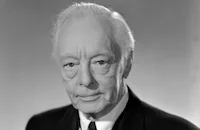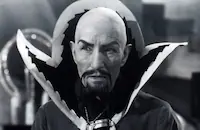The Decision of Christopher Blake
Brief Synopsis
Cast & Crew
Peter Godfrey
Alexis Smith
Robert Douglas
Cecil Kellaway
Ted Donaldson
John Hoyt
Film Details
Technical Specs

Synopsis
Traveling with his mother Evelyn on the train on his return from camp, twelve-year-old Christopher Blake dreams that he has developed a plan for world peace. As the train arrives in Los Angeles, Chris asks his mother if his father Ken will be there to meet them, but she avoids answering his question. When Chris continues to press her, she replies that Ken is out of town. After Evelyn goes upstairs for a nap, however, Ken arrives at the house. He starts to tell Chris something, but ends by agreeing to stay home for Chris's birthday. After Chris is in bed for the night, Evelyn demands that Ken tell Chris about their separation and pending divorce. Although Ken asked for the divorce when he fell in love with a sculptor named Ruth, he no longer is sure that he made the right decision. Evelyn, on the other hand, is too hurt by the knowledge of his affair to reconcile. The next morning, Chris asks to accompany his mother to her lawyer's office and accidentally learns about the divorce from the lawyer's secretary. When Ken and Evelyn are unable to reach an agreement as to which parent will have custody of Chris, the lawyers reply that Chris will have to make that choice himself. On the day of Chris's thirteenth birthday, Ken is not present, but Evelyn reassures Chris that both she and his father love him and want him to love both of them. Later, Ken takes Chris to a play during which Chris falls asleep and dreams that he is a great playwright, who authors a play about divorce. Afterward, Chris and Ken spend some time together at their lakeside cottage. In response to Chris's questions, Ken tells his son about Ruth, and that night Chris has a dream in which he begs Ruth not to break up his parents' marriage. When Ken drops Chris off at Evelyn's, he again begs her to call off the divorce for Chris's sake, but when he fails to say that he loves her, Evelyn sends him away. Chris then dreams that he is being honored for developing an atom bomb and a world peace plan, when he is shot by John Wilkes Booth, and that his sorrowing parents are reunited over his body. At the Blakes's divorce hearing, the judge questions a teary Chris, who cannot make a decision about who will care for him. Later, while the judge speaks privately with Chris, Ken apologizes to Evelyn for his behavior and adds that he still loves her. After Chris tells his mother that he has chosen to live with his father and then tells his father that he has chosen to live with his mother, both parents realize that they are going to lose the most important person in their lives and reconcile.

Director

Peter Godfrey
Cast

Alexis Smith

Robert Douglas

Cecil Kellaway
Ted Donaldson

John Hoyt

Harry Davenport

Mary Wickes
Art Baker

Lois Maxwell

Douglas Kennedy
Bert Hanlon
Dick Baron
Henrietta Taylor

Renee Godfrey
Guy Wilkerson

Peter Godfrey
Ronnie Ralph
Art Miles
William Johnstone

Charles Middleton
Barry Bernard
Edith Boyd
Elena Boyd
Mildred Boyd
Harry Lewis
Joy Barlowe
Crew
Al Alleborn
Milo Anderson
Claude Archer
Harry Barndollar
John Beckman
Murray Cutter
Edwin Du Par
Leo F. Forbstein
Karl Freund
Howard Lynn
Ranald Macdougall
Ranald Macdougall
Jack Mcconaghy
Harry Mines
Frederick Richards
C. A. Riggs
Max Steiner
Perc Westmore

Film Details
Technical Specs

Quotes
Trivia
Notes
The film's working title was Christopher Blake. A December 23, 1946 Daily Variety news item notes that Warner Bros. purchased the Moss Hart play for $400,000. Ranald MacDougall's onscreen credit reads "Produced and written for the screen by Ranald MacDougall." A August 1, 1947 Hollywood Reporter news item reports that director Irving Rapper left the production after he protested the casting of Alexis Smith and Robert Douglas in the leads because he felt that both were unsuited to the roles. Although Rapper claimed that he was suspended, Warner Bros. called his dismissal from the production a "lay-off." He was replaced by Peter Godfrey. The sets for the dream sequences used blow-ups of rough sketches done in comic book style, and characters in the dreams are dressed in exaggerated costumes. Many of the characters in the dreams are played by John Hoyt, who performs the role of "Mr. Caldwell," "Evelyn's" lawyer and is perceived by "Christopher" as a villain.












